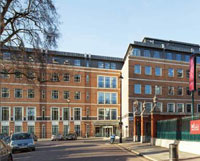The phrase “northern powerhouse”, to encapsulate the potential of the North of England, was coined by the chancellor of the Exchequer recently.
That latent potential, and the ability of the great cities of the North to become an economic powerhouse complementing London, has long been recognised.
And these are particularly promising times. As MIPIM UK approaches next week, Northern cities such as Manchester are in a confident mood and ready to seize a number of potentially game-changing opportunities.
The first of these is the prospect of dramatically improved connectivity, a prerequisite for competing in international markets.
Not only is the extra capacity that will be realised through HS2 fundamental to the future if we are not to be left with a crippled rail network, but the opportunities that will be stimulated as areas get HS2-ready are enormous.
Transport links
But Manchester, Liverpool, Leeds, Newcastle and Sheffield have also come together as One North with a set of proposals for improved transport links between northern cities that will complement HS2.
If adopted, the £15bn, 15-year investment plan would deliver benefits for the whole of the North of England, including up to 150% additional capacity on roads and as much as 55% faster journey times on a faster, more frequent, interconnected rail network.
It would also deliver new trains running on a dedicated 125mph trans-Pennine rail link, a faster route to Newcastle and improved access to ports and airports.
One North has been supported by a number of other key cities and regions, including Hull, Bradford, Wakefield and York.
And the government has made positive noises about responding to its ambitions, recognising that HS2 alone is not enough if it is serious about rebalancing the nation’s economy.
Harnessing the strengths of our world-class institutions to open up whole new business sectors is another opportunity the North is rising to. In Manchester, these research specialisms are in areas such as advanced materials and life sciences.
Here in Manchester, the National Graphene Institute is nearing completion and work will soon start on the Graphene Engineering Innovation Centre. Both facilities are focused on the commercial exploitation of this wonder substance, first isolated at Manchester University.
The final opportunity is perhaps the greatest. The Scottish referendum exposed what many have known for some time – that the UK’s overly centralised model simply does not work.
Areas should be able to tailor their budgets and policies to their own needs and priorities, rather than having a “one size fits all” approach handed down.
This is not just an issue for the North, but for all of the core cities – England’s largest cities outside of London, plus Glasgow and Cardiff – in particular. These cities, which have a major economic influence, need to control the levers of growth and the reform of public services.
Cost of failure
If you need an illustration of the fact that the current system isn’t working, consider Greater Manchester. Despite all the cuts to public sector spending in many areas, the overall amount spent here has barely changed since 2001 because costs are just being shunted from one sector to another. We are counting the cost of failure rather than investing in success.
But there is another way. Given greater freedoms and flexibilities, we could increase tax take through increased economic success while reducing public expenditure by supporting residents to become more independent.
Greater Manchester’s 2.7m population is only slightly less than that of Wales, and larger than Northern Ireland’s. Our economy contributes £50.9bn a year to the UK, compared with Wales’ £47.3bn. Yet we enjoy a fraction of the freedoms.
While we are proud of our record, we believe we could do so much more to create better conditions for economic growth.
To give one example, greater control over our skills budget would help to create a workforce with the skills that match the jobs being created.
Greater influence over regeneration and housing would help to create quality neighbourhoods.
Of course, this would have to be an incremental approach rather than a big bang, but we need a new deal with government and we should move at the pace of the fastest, readiest places, rather than the slowest.
All of these opportunities have the potential to make an enormous contribution to a stronger national economy. If we are to look at this moment as the true beginnings of a Northern powerhouse, we need all the main political parties to demonstrate their commitment to making devolution work – especially for our cities.
Howard Bernstein is chief executive of Manchester city council











